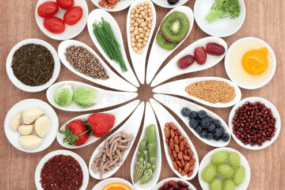
Introduction
In today’s fast-paced world, maintaining a balanced and nutritious diet can be a challenge. However, developing healthy eating habits is essential for overall well-being, boosting energy levels, and preventing chronic diseases. This guide provides a comprehensive approach to nourishing your body with the right foods and making sustainable choices for a healthier lifestyle.
The Fundamentals of Healthy Eating
Healthy eating is about more than just counting calories or following the latest diet trends. It involves consuming a variety of nutrient-dense foods that provide essential vitamins, minerals, and macronutrients. Here are the fundamental principles:
- Balanced Macronutrients: A healthy diet includes a proper balance of carbohydrates, proteins, and fats.
- Whole Foods Over Processed Foods: Whole foods like fruits, vegetables, whole grains, nuts, and seeds provide more nutrients and fewer additives than processed foods.
- Hydration is Key: Drinking enough water supports digestion, circulation, and overall health.
- Mindful Eating: Paying attention to hunger and fullness cues can help prevent overeating.
- Portion Control: Eating in moderation helps maintain a healthy weight and prevents overconsumption of unhealthy foods.
The Importance of Macronutrients
Carbohydrates: The Primary Energy Source
Carbohydrates are essential for energy production. Choose complex carbs such as:
- Whole grains (brown rice, quinoa, oats)
- Fruits and vegetables
- Legumes (beans, lentils, chickpeas)
Avoid refined carbs such as white bread, pastries, and sugary drinks, which can lead to energy crashes and weight gain.
Proteins: Building Blocks of the Body
Proteins are necessary for muscle repair, immune function, and hormone production. Good sources include:
- Plant-based proteins (lentils, beans, tofu, tempeh, quinoa, nuts)
- Lean animal proteins (chicken, fish, eggs)
- Dairy and dairy alternatives (Greek yogurt, almond milk, soy milk)
Healthy Fats: Essential for Brain and Heart Health
Not all fats are bad. Healthy fats support cognitive function and reduce inflammation. Opt for:
- Avocados
- Nuts and seeds (almonds, walnuts, chia seeds, flaxseeds)
- Olive oil and coconut oil
- Fatty fish like salmon and mackerel
Avoid trans fats and excessive saturated fats found in processed and fried foods.
The Role of Micronutrients
Vitamins and Minerals
Vitamins and minerals support various bodily functions, including immunity, bone health, and metabolism. Essential micronutrients include:
- Vitamin C (citrus fruits, bell peppers, strawberries) for immunity
- Iron (spinach, lentils, tofu) for oxygen transport
- Calcium (almond milk, leafy greens, fortified foods) for bone health
- Omega-3 fatty acids (flaxseeds, walnuts, chia seeds) for heart and brain health
The Impact of Hydration
Water is crucial for digestion, circulation, temperature regulation, and detoxification. Aim to drink at least 8 glasses of water a day and increase intake based on activity levels. Herbal teas, coconut water, and water-rich foods like cucumbers and watermelon also contribute to hydration.
Healthy Eating Habits to Adopt
1. Eat a Rainbow
Consume a variety of colorful fruits and vegetables to ensure you get a broad range of nutrients.
2. Plan Your Meals
Meal prepping helps maintain portion control and ensures healthier food choices.
3. Cook at Home
Cooking at home allows you to control ingredients and avoid unhealthy additives in restaurant meals.
4. Read Food Labels
Understanding ingredient lists and nutritional facts can help make informed food choices.
5. Limit Sugar and Salt Intake
Excess sugar and sodium contribute to obesity, high blood pressure, and diabetes. Opt for natural sweeteners like honey or maple syrup and use herbs and spices instead of salt for flavor.
6. Practice Portion Control
Using smaller plates and mindful eating techniques can prevent overeating.
7. Listen to Your Body
Eat when you’re hungry and stop when you’re full to maintain a healthy relationship with food.
Special Diet Considerations
Plant-Based Diets
A plant-based diet can provide all necessary nutrients if well-planned. Focus on diverse plant proteins and vitamin B12 supplementation if needed.
Mediterranean Diet
Rich in fruits, vegetables, whole grains, and healthy fats, this diet is linked to heart health and longevity.
Keto and Low-Carb Diets
These diets can be effective for weight loss but should be balanced to avoid nutritional deficiencies.
Intermittent Fasting
This eating pattern involves cycling between periods of eating and fasting, which may support metabolism and weight management.
Overcoming Common Eating Challenges
Emotional Eating
Identify triggers and find healthier coping mechanisms such as exercise or meditation.
Busy Lifestyle
Prepare healthy snacks and plan meals in advance to avoid resorting to fast food.
Eating Out
Choose healthier menu options such as grilled over fried foods, and request dressings and sauces on the side.
Conclusion
Healthy eating is a lifelong commitment that requires conscious choices and balance. By incorporating nutrient-rich foods, staying hydrated, and practicing mindful eating, you can nourish your body and support overall well-being. Start small, be consistent, and enjoy the journey to a healthier you!























